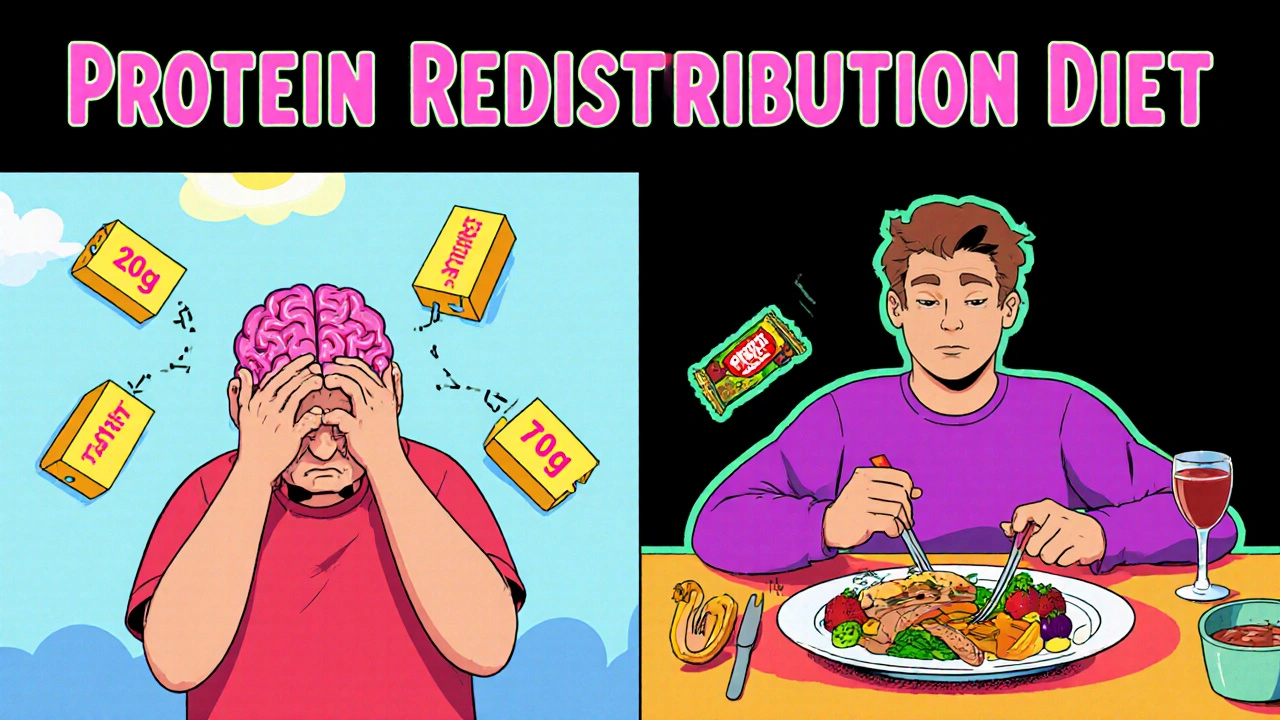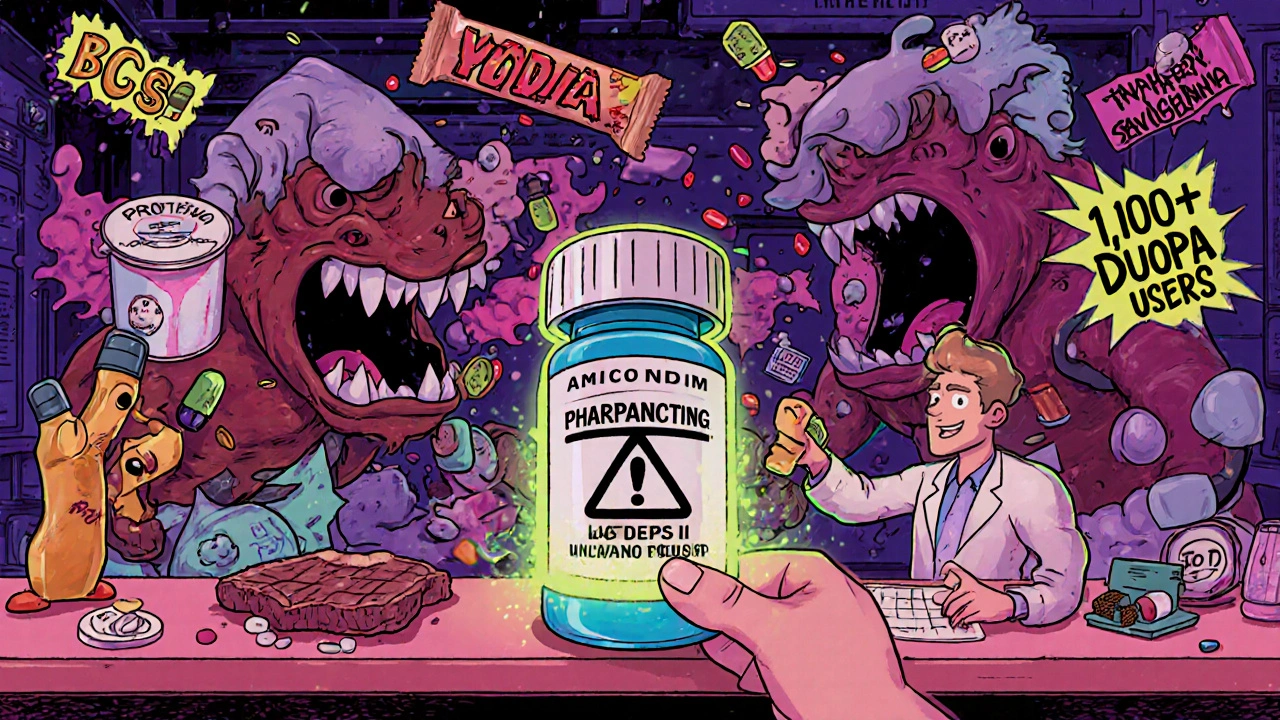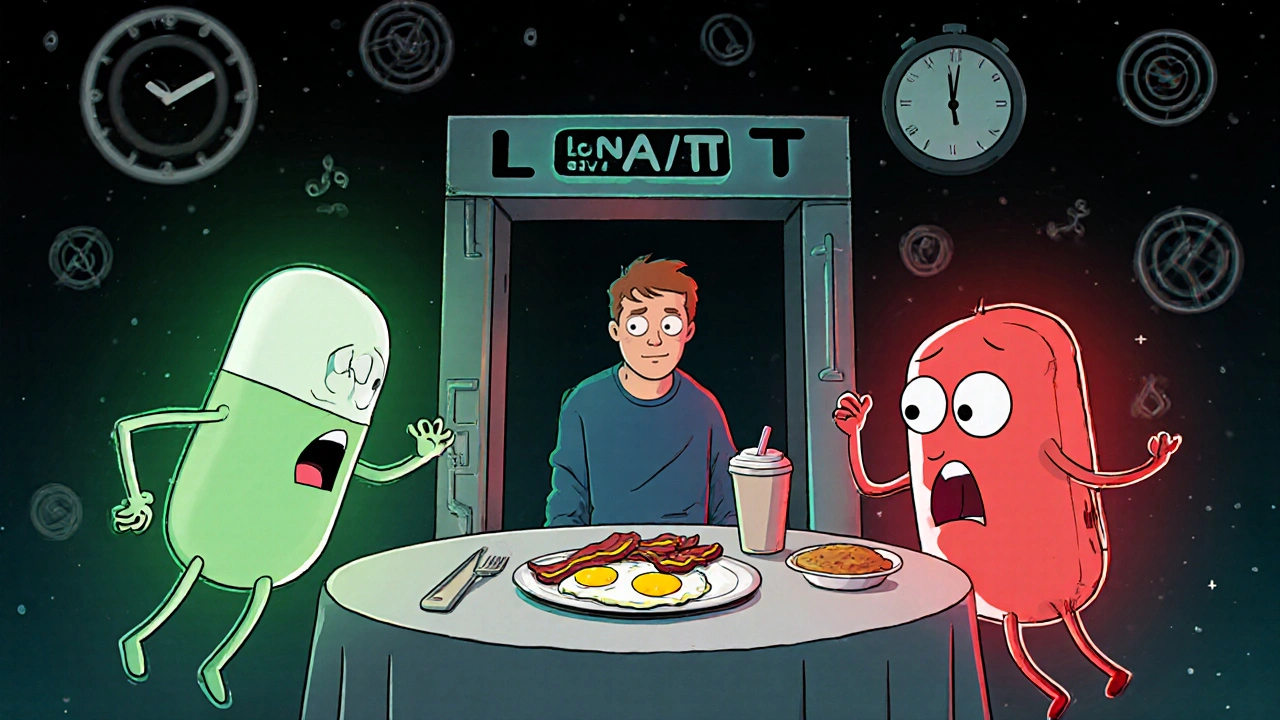Take your medication with food. That’s what your doctor says. But what if that food is a steak, a protein shake, or even a bowl of Greek yogurt? For some people, eating protein-rich meals at the wrong time can make their medication less effective - sometimes by half. This isn’t just a theory. It’s a well-documented, clinically significant issue affecting thousands, especially those managing Parkinson’s disease, epilepsy, and certain infections.
Why Protein Interferes With Medication
It all comes down to how your body moves drugs into your bloodstream - and into your brain. Many medications, especially those that are small molecules, rely on special transporters in your gut and blood-brain barrier to get where they need to go. One of these transporter systems, called the large neutral amino acid transporter (LNAAT), carries both essential amino acids from protein and certain drugs like levodopa, the main treatment for Parkinson’s.
When you eat a protein-heavy meal, your blood floods with amino acids like leucine, isoleucine, and phenylalanine. These amino acids compete directly with levodopa for the same transporters. The result? Less levodopa gets across the blood-brain barrier. Studies show this can cut absorption by 30-50% in about 60% of Parkinson’s patients. That means more tremors, stiffness, and ‘off’ time - even if you’re taking your pill exactly as prescribed.
This isn’t limited to Parkinson’s. Other drugs that use the same transporters include certain antiepileptics like gabapentin and pregabalin. Even some antibiotics, like penicillin, can be affected. Protein doesn’t just block absorption - it also slows down how fast your stomach empties. That delays when the drug even reaches your small intestine, where most absorption happens. For drugs that need to hit peak levels quickly, that delay can mean the difference between symptom control and a flare-up.
Not All Medications Are Affected the Same Way
Here’s the good news: not every drug is impacted by protein. The Biopharmaceutics Classification System (BCS) helps doctors understand which drugs are vulnerable. Drugs in BCS Class I - high solubility, high permeability - like aspirin or atorvastatin - aren’t really affected by food. They absorb easily no matter what you’ve eaten.
But BCS Class III drugs - high solubility, low permeability - are the ones to watch. Levodopa is the classic example. It dissolves well but struggles to cross membranes without help. That’s why it’s so sensitive to protein. Other Class III drugs include metformin and some antivirals. If your medication falls into this category, timing matters more than you think.
And then there are drugs that actually absorb better with protein. Some antibiotics, like amoxicillin, see slightly higher blood levels when taken with a meal - not because of protein specifically, but because food increases blood flow to the gut. Still, for most medications, protein is a problem, not a helper.
Levodopa: The Most Studied Case
If you’re taking levodopa or carbidopa/levodopa (Sinemet, Rytary, etc.), protein timing isn’t optional - it’s critical. The Michael J. Fox Foundation estimates that protein interference contributes to 12-15% of treatment failures in Parkinson’s. That’s not a small number. It’s a major reason people feel worse even when they’re ‘doing everything right.’
Research shows that a meal with just 50 grams of protein - think two eggs, a cup of cottage cheese, and a chicken breast - can reduce levodopa bioavailability by 25%. That’s enough to make someone feel like their medication isn’t working anymore.
But here’s the breakthrough: you don’t have to cut protein out of your diet. You just need to move it. The protein redistribution diet - consuming 70% of your daily protein at dinner - has been proven in multiple clinical trials to improve ‘on’ time by 2.5 hours per day. That’s more than two extra hours of mobility, speech, and control. And it doesn’t require starvation. It requires strategy.

What About Low-Protein Diets?
Some people try cutting protein altogether. It sounds logical. But it’s dangerous. A 2024 study in the Journal of Parkinson’s Disease found that 23% of patients on strict low-protein diets developed muscle wasting within 18 months. That’s not just weakness - it’s increased fall risk, slower recovery, and worse quality of life.
Doctors now recommend 0.8-1.0 grams of protein per kilogram of body weight per day. For a 70kg person, that’s about 56-70 grams total. The trick is spreading it out. Instead of 20g at breakfast, 20g at lunch, and 30g at dinner, flip it: 10g at breakfast, 10g at lunch, and 50g at dinner.
This way, your morning and afternoon - when you need levodopa to work best - aren’t fighting a protein overload. Your body still gets enough protein to maintain muscle, but your medication gets a fighting chance.
Real People, Real Results
On the Parkinson’s Foundation Forum, users share their wins. One person, u/ParkinsonsWarrior, used a wearable sensor to track movement and found their ‘off’ time dropped from 5.2 hours to just 2.1 hours after switching to protein redistribution. Another user, u/TremblingHands, tried a low-protein diet and lost muscle - then switched to Duopa, an intestinal gel that bypasses the stomach entirely, and gained back 8 pounds.
These aren’t outliers. The Michael J. Fox Foundation’s 2024 survey of 1,243 patients found that 57% struggled with timing at first. But after working with a Parkinson’s-specialized dietitian, 78% improved symptom control.
Tools like the ‘ProteinTracker for PD’ app help. It scans barcodes, logs meals, and alerts you when a snack has more than 5g of protein - enough to interfere with your morning dose. Users report 40% fewer timing mistakes after using it for three months.

How to Get It Right
Here’s what works, based on the American Academy of Neurology’s 2024 guidelines:
- Take levodopa 30-60 minutes before meals containing more than 15g of protein.
- If you get nauseous, have a low-protein snack (under 5g) like a banana, apple, or a slice of low-protein bread (2g protein instead of 5g).
- Plan your meals so the bulk of your protein (70%) is at dinner.
- Avoid protein shakes, energy bars, and ‘high-protein’ yogurts at breakfast or lunch - they can sneak in 15-20g of protein in one serving.
- Use apps or food labels to track protein. Many processed foods hide protein - granola bars, protein-fortified oatmeal, and even some soups.
For people on other medications - like gabapentin or certain antibiotics - check with your pharmacist. Don’t assume it’s safe. Always ask: ‘Does this medicine interact with protein?’
What’s Changing in the Industry
This isn’t just a patient problem - it’s a system problem. Until recently, drug labels rarely mentioned protein. The European Medicines Agency only started requiring specific protein instructions for CNS drugs in January 2025. Before that, 61% of medication guides gave no guidance on food interactions.
Now, pharmaceutical companies are forced to test drugs with high-protein meals. In 2020, only 67% of Phase III trials included food-effect studies. By 2025, that number jumped to 92%. The FDA is even working on a new ‘Protein Interaction Score’ label - similar to the alcohol warning on some pills - to make it obvious which drugs are affected.
And new treatments are emerging. Duopa, a levodopa gel pumped directly into the small intestine, bypasses stomach absorption entirely. Medicare data shows over 12,000 new users each year. Time-restricted eating - eating all protein between noon and 8 p.m. - improved levodopa response by 32% in a 2025 study. Even gut probiotics are being studied for their ability to reduce amino acid competition.
What You Can Do Today
If you take any medication regularly, especially for Parkinson’s, epilepsy, or chronic infection, here’s your action plan:
- Write down your daily medication schedule.
- Track your meals for three days - not just what you ate, but how much protein.
- Check the label or ask your pharmacist: ‘Is this affected by protein?’
- If yes, try taking it 45 minutes before breakfast and lunch.
- Move protein to dinner.
- Use a free app like ProteinTracker for PD or MyFitnessPal to log protein.
- Ask your doctor for a referral to a dietitian who specializes in medication interactions.
This isn’t about eating less. It’s about eating smarter. Your medication doesn’t need to fight your food. With a few simple changes, you can make them work together - not against each other.


Comments
Pallab Dasgupta
November 23, 2025 AT 08:25This is the most important thing I’ve read all year. I’ve been taking my Parkinson’s meds with breakfast like a dumbass for years. My wife finally made me try the protein-at-dinner thing - now I can actually walk to the fridge without falling over. Thank you.
Agastya Shukla
November 24, 2025 AT 06:54Interesting. The LNAAT competition mechanism is well-documented in pharmacokinetic literature - particularly in BCS Class III compounds. But I’m curious if there’s data on individual variability in transporter expression. Are there SNPs in SLC7A5 that correlate with severity of interference? Would be useful for personalized dosing.
Emily Craig
November 26, 2025 AT 06:54So basically, if you’re rich enough to afford a dietitian and an app, you get to live. If you’re poor and eating rice and beans? Tough luck. This system is designed to fail people who can’t afford to optimize their meals like a biohacker.
Patricia McElhinney
November 27, 2025 AT 07:49Actually, the FDA doesn’t have a 'Protein Interaction Score' - that’s completely fabricated. You’re spreading misinformation. The EMA only requires food-effect studies for CNS drugs, not protein-specific labeling. This article is dangerously inaccurate.
Dolapo Eniola
November 28, 2025 AT 10:05USA always overcomplicates everything. In Nigeria, we just take our meds with whatever we eat - and we’re fine. Maybe your bodies are too weak from eating all this processed junk. Protein is life, not a drug enemy. 🤷♂️
Andrew Camacho
November 28, 2025 AT 17:26Let me be the one to say it - this whole protein redistribution thing is just a fancy way of saying 'starve yourself during the day.' They want you to eat protein at night so you can sleep better… but what if you’re diabetic? Or have GERD? Or just hate eating chicken at midnight? This isn’t medicine - it’s a cult.
Ellen Sales
November 29, 2025 AT 08:21I’m a caregiver for my mom with Parkinson’s - and this changed everything. We started using MyFitnessPal to log protein. We switched to low-protein bread (2g vs 5g), banana snacks before meds, and dinner is basically a steak dinner with mashed potatoes. She went from 6 hours of 'off' time to 2.5. I cried. Not because it’s perfect - but because for the first time, she’s herself again.
Arup Kuri
November 30, 2025 AT 13:22They don't want you to know this but Big Pharma profits more when you need more pills because your protein messes with absorption. That's why they never told you. They're hiding the truth. You're being manipulated. Wake up.
Sharley Agarwal
December 1, 2025 AT 22:42I tried this. Lost 15 lbs. Couldn't lift my grandkids. Now I'm back to eating protein at breakfast. My tremors are worse - but at least I can still hold a spoon.
Erika Hunt
December 2, 2025 AT 22:45I appreciate the depth here - but I wonder if we’re missing the bigger picture. What if the real issue isn’t protein timing, but gut microbiome disruption? Recent studies suggest that dysbiosis alters amino acid metabolism, which could amplify transporter competition. Maybe we need to treat the gut first - not just rearrange meals. I’d love to see a longitudinal study combining probiotics with protein redistribution.
Josh Zubkoff
December 4, 2025 AT 04:13Look - I’ve read the Michael J. Fox Foundation reports. I’ve reviewed the Phase III trials. I’ve talked to neurologists. And let me tell you - this whole 'protein redistribution' thing is basically a Band-Aid on a hemorrhage. The real problem? Levodopa is a 1960s drug with a 1960s delivery system. We’re optimizing around a broken tool. The fact that we’re still telling people to time meals around a molecule that doesn’t even cross the BBB efficiently? That’s not medicine. That’s desperation dressed up as a diet. Duopa? Great. But it costs $100K a year. So congrats - you’ve solved the problem for the 1% who can afford to bypass their entire digestive system. The rest of us? We’re just eating bananas and hoping.